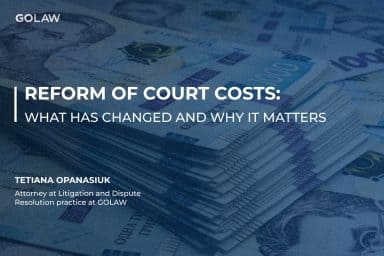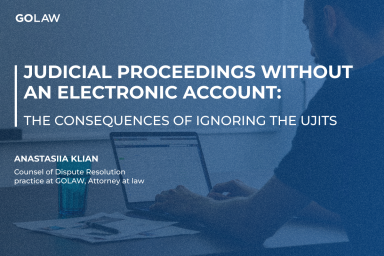The new Supreme Court to start to work / The new Procedure Codes to come into force
Tags
The new Supreme Court to start to work. The new Procedure Codes to come into force
On November 30, 2017, the Plenary Assembly of the new Supreme Court defined the date of the beginning of the Court’s work – December 15, 2017. Thus, the Supreme Court will be composed of: the Grand Chamber of the Supreme Court; Administrative Court of Cassation; Commercial Court of Cassation; Criminal Court of Cassation; and Civil Court of Cassation.
It is planned that the new versions of the Commercial Procedure Code of Ukraine, the Civil Procedure Code of Ukraine, and the Code of Administrative Proceedings of Ukraine, as well as amendments to other legislative acts related to the judicial reform in Ukraine will come into force on the same day.
We would like to draw your attention to the basic identical novelties of these procedure codes:
1. The introduction of the Electronic court (E-court) aimed to reduce the timeframe for consideration of cases and eliminate the “paperwork”. Herewith, while submitting procedural documents to the court in electronic form, a coefficient of 0.8 will be applied to reduce the appropriate rate of court fee.
The E-court introduction stipulates that:
- Procedural and other documents and evidence in paper form are to be transformed into electronic form and attached to the electronic case file not later than three days after the date of their receipt by the court;
- The court is to send judgements and other procedural documents to the official email addresses of the parties to the judicial proceedings;
- If for some technical reasons the court is unable to consider a case in electronic form within the timeframe established by the procedure codes, this case will be considered based on the documents available in paper form (for this purpose, the case file will be promptly transformed into paper form);
- Procedural and other documents and evidence in paper form will be stored in the annex to the case in the court of first instance and, if necessary, parties to the case will be able to examine them, and the court of appeal or cassation – to request them after the receipt of the corresponding appeal or cassation appeal.
2. Dispute resolution with the participation of a judge for the purpose of unloading courts by way of increasing the number of cases ending with the conciliation of parties. The procedure has the following features:
- It is conducted with the consent of the parties prior to the consideration of the case on the merits;
- The timeframe is no more than 30 days and cannot be extended;
- It is conducted in the form of joint (with the participation of all parties, their representatives, and a judge) and closed (on the initiative of the judge, separately with each of the parties) meetings;
- The judge is not entitled either to give legal advice and recommendations to the parties, or to provide assessment of evidence in the case;
- The procedure is confidential, no minutes of the meeting are kept, and no recording with technical means is carried out;
- It is prohibited to use portable and sound recording equipment, as well as take photographs, shoot films, and record video and sound;
- The procedure will be terminated in the event of: a party submitting an application for its termination; the completion of timeframe; any party delaying the resolution of the dispute; the conclusion of an agreement between the parties;
- The procedure codes provide for certain categories of cases to which this procedure shall not apply, in particular, in the event of a third party intervening and making independent claims as regards the subject of the dispute.
3. The parties to the judicial proceedings are obliged to submit all evidence available to them, along with the following relevant procedural documents:
- The plaintiff – a statement of claim;
- The defendant – a response to the statement of claim;
- The third person – written explanations.
4. The abuse of procedural rights is not allowed. In the event of any party to the judicial proceedings abusing its procedural rights, the court will take appropriate measures. Thus, the court can render a decision to recover a fine from the person concerned:
4.1 In the amount of 0.3 to 3 (in civil and administrative proceedings) and 1 to 10 (in commercial proceedings) times the minimum subsistence income for able-bodied persons in the events of:
- Failure to perform procedural duties;
- Abuse of procedural rights;
- Failure to inform the court about the inability to submit evidence requested by the court;
- Using portable and sound recording equipment, as well as taking photographs, filming, or performing video and sound recording in the course of the dispute resolution procedure with the participation of a judge.
4.2 In the amount of 1 to 10 (in civil and administrative proceedings) and 5 to 50 (in the commercial proceedings) times the minimum subsistence income for able-bodied persons in the events of repeated, systematic, or recurrent commission of the aforementioned violations.
5. The new procedure codes stipulate that the representation in court, as a form of legal assistance, is to be carried out exclusively by the lawyer (professional legal aid), except in the events defined by the law.

Kateryna Manoylenko
Partner, Head of Litigation and Dispute Resolution practice, Attorney at law
- Contacts
- 31/33 Kniaziv Ostrozkykh St, Zorianyi Business Center, Kyiv, Ukraine, 01010
- k.manoylenko@golaw.ua
- +380 44 581 1220
- Recognitions
- The Legal 500 EMEA 2024
- Who's Who Legal 2022 - 2024
Sign up to be aware
New achievements are inspired by information. GO further, don’t miss out GOLAW news and legal alerts
Our expertise
-
- Antitrust and Competition
- Banking and Finance
- Compliance, Corporate Governance and Risk Management
- Corporate and M&A
- Criminal and White Collar Defence
- Defense in Anti-corruption procedures and regulations
- Labor and Employment
- Natural Resources and Environment
- Government Relations (GR)
- Insolvency and Corporate Recovery
- Intellectual property
- International trade
- Legal support of business and private Сlients in Germany
- Litigation and dispute resolution
- Private clients
- Real Estate and Construction
- Energy and Natural Resources
- Restructuring, Claims and Recoveries
- Martial Law
- Tax and Customs
-
- Agribusiness
- Aviation
- Chemical industry
- Engineering, Construction and Building Materials
- Natural Resources and Environment
- Financial institutions
- IT and AI
- Industry and manufacturing
- Healthcare industries, Life sciences and Pharmaceuticals
- Media, Entertainment, Sports and Gambling
- Retail, FMCG and E-Commerce
- Transport and Logistics
We use cookies to improve performance of our website and your user experience.
Cookies policy
Cookies settings







